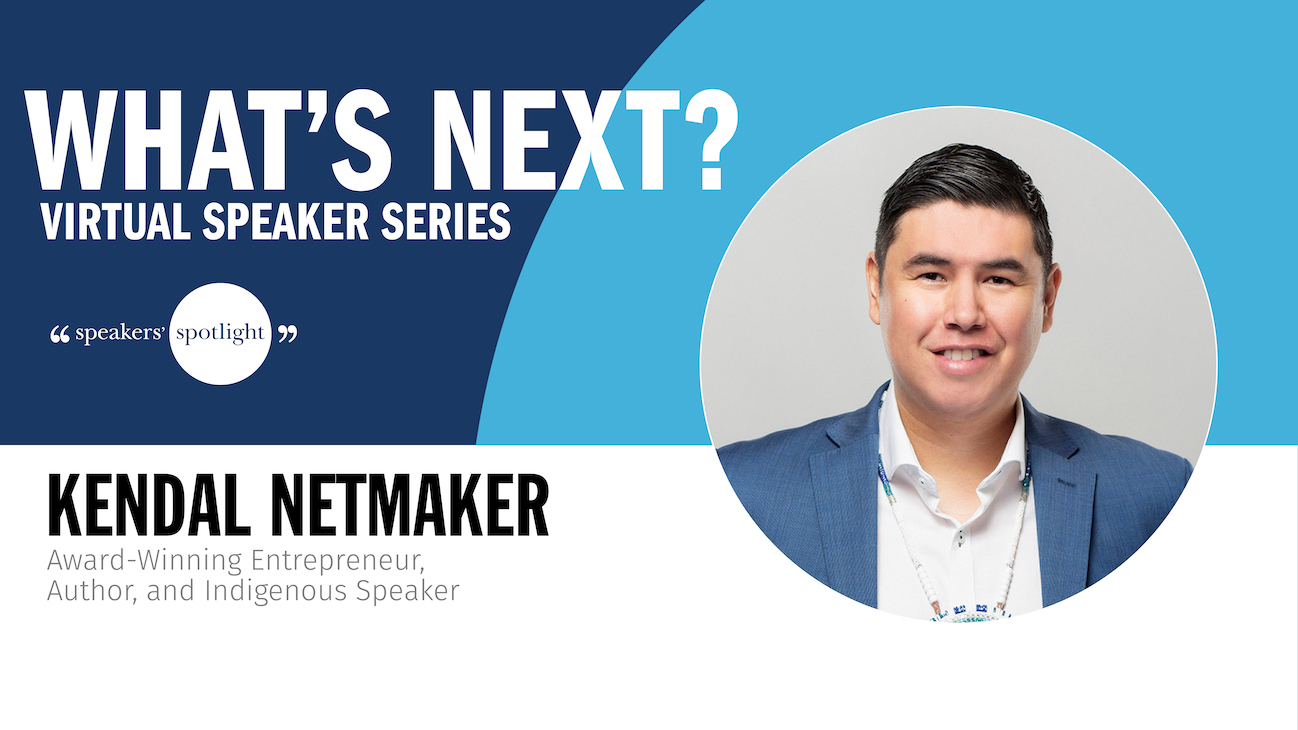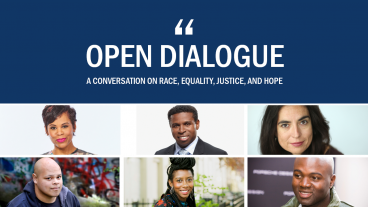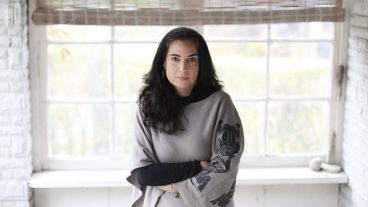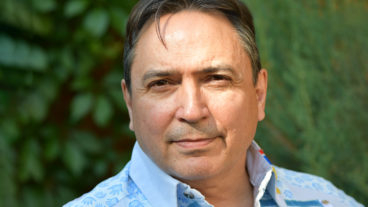The recent discoveries of mass graves of Indigenous children on residential school sites have escalated a dialogue in our country long overdue. There is now a sense of urgency felt across Canada to fix these wrongs, which has created an opportunity to finally begin bridging the divide between Indigenous and non-Indigenous people, and move forward into a more equitable and inclusive future that benefits all.
In this week’s edition of our Virtual Speaker Series, we were joined by award-winning entrepreneur, author, and Indigenous speaker Kendal Netmaker. From Sweetgrass First Nation, Kendal lives and thrives in two different worlds, he says, and speaks to us as a bridge between them. He seeks to share the teachings that were passed on to him from his elders, generation to generation to generation, so that we too can benefit from these lessons and contribute to a national dialogue that leads to change.
It is only through sharing and understanding this Indigenous knowledge and history, can we truly begin closing the gap between Indigenous and mainstream culture, and see a future where we are all working, succeeding, and prospering together.
Indigenous Culture and History
Researchers have discovered that Indigenous people were living across North America thousands of years before Europeans came. They had their own way of trading, growing food, harvesting, medicine, hunting, gathering, etc. that sustained them. The buffalo were their main source of survival. They would migrate with them and use each piece of this animal to feed, clothe, and nurture them throughout the seasons.
For many years, Kendal said, elders foretold that a different race would come to this land. Christopher Columbus is hailed as a hero for finding North America, but he is a mass murderer who killed millions of Indigenous people, enslaved them, and brought them home as trophies. His goal was to use brutal force to take over this land. The fact that we celebrate this man, Kendal said, and have a holiday dedicated to him, is evidence of how uneducated we are about our own history.
When the Europeans came, they didn’t know how to survive in this climate. Many of my Indigenous ancestors, Kendal said, helped them. Showed them how to cure scurvy, how to hunt, how to use the buffalo, how to create shelter, etc. Over time, they began trading with each other and lived side by side.
But, the Europeans wanted more, and Indigenous people were in the way of that. A government was formed and they started giving land away to settlers, forcing Indigenous people to move away from their land and sign the numbered treaties.
Many Indigenous people did not want to sign those treaties, Kendal said, because it meant they would be separated from each other. The government knew the power of numbers though and forced separation, not only between Indigenous people but also between their main source of food, the buffalo. The government knew of their dependence on the buffalo and slaughtered them across the country. Indigenous people were starved and this forced them to sign the treaties.
Through the treaties, they were promised food and resources to help self-sustain themselves, but this never came. They were still seen as “in the way”. So, the government created the Indian Residential School system, designed to assimilate Indigenous people into the mainstream. Created in the late 1800s, it was enforced by the RCMP and saw children forcibly taken from their homes. If parents resisted, they could have been arrested.
“It hurts talking about this,” Kendal said. I had a lot of family members who went through this and I can’t imagine as a parent the feeling of what this looks like.”
Children had their braids cut, ties to their family cut, and endured gruesome forms of abuse — mentally, physically, and sexually. There are many children that will not be found, Kendal said, and this hurts me because this is what created this country. Outside of residential schools, Indigenous people were further stripped from their culture through the Indian Act, a racist way of systemizing Indigenous people.
“My wife talks about her great grandfather,” Kendal said. “During the time of the Indian Act, he had to go hide in the bush to practice his sweat lodge, to practice his ceremonies, and they would have to take it down in the same day. They couldn’t have more than a couple people in practicing their ceremony because the Indian agent, who acted like border patrol, would come and arrest them. Take all their stuff down and confiscate everything, because they weren’t allowed to practice their ceremony.”
Indigenous people were hostages in their own country, Kendal said. They were not permitted to have a business, to trade or even associate with non-indigenous people. They were forced into a place of hopelessness, while others were benefitting and prospering from this system. Indigenous people are hundreds of years behind, Kendal said, because they were forcibly kept away from progress. This is the divide we are fighting against today.
Moving Forward Together
None of us were educated about this history, it is only now being taught in our school systems. Although raised with Indigenous spirituality and culture, even Kendal was unaware of the history of his people in this country until he left his community and went to university. Now we are quickly backtracking, Kendal said, because we have this huge gap in knowledge.
There is a divide in this country right now because of assumptions, Kendal said. These assumptions exists because there hasn’t been a dialogue between these neighbouring cultures; there hasn’t been an opportunity to share our stories. This is the basis of our problems.
“When there is a lack of understanding,” he said, “it creates assumptions, it creates problems, it creates ignorance, it creates prolonged racism, which effects our productivity as a workforce. We have to fill that gap. How do we do that? By understanding each other’s story. When we try to understand each other’s stories, progress happens, less assumptions, so that when there is a conflict we can come to the same table and figure it out more effectively.”
We have no control over what happened in the past, but we can control how we act and think of each other today. We don’t have to treat each other like our ancestors treated each other, Kendal said.
As someone who has found success living in both worlds, Kendal feels he has a responsibility to fuel the dialogue. He is only here because of the sacrifices of his ancestors, he said. They stopped things for him so that his life could be lived with less trauma, and with more opportunity. Now that we have the knowledge, it is our responsibility to carry that torch with him; to continue the dialogue and pass it on to our families, our workplaces, and our communities.
The best thing we can all do today, Kendal said, is role model to our children the future we want to see. It begins with starting and continuing this dialogue, seeking knowledge and listening, because if we don’t hear it, Kendal said, the ignorance doesn’t leave. Change starts with us.
Recommended Reading
To learn more about Indigenous history and the divide we are seeing today, Kendal recommended the following books:
- Clearing the Plains: Disease, Politics of Starvation, and the Loss of Aboriginal Life by James Daschuk
- 21 Things You May Not Know About the Indian Act: Helping Canadians Make Reconciliation with Indigenous Peoples a Reality by Bob Joseph
- Call Me Indian: From the Trauma of Residential School to Becoming the NHL’s First Treaty Indigenous Player by Fred Sasakamoose
Creating More Inclusive Workplaces
Kendal also shared five things to keep in mind to build more inclusive and welcoming workplaces for Indigenous people.
- In Indigenous culture, it is disrespectful to stare at people. It is a sign of aggression, Kendal said. Instead, to show respect, Indigenous people will look away. Kendal experienced this disconnect between Indigenous and mainstream culture as soon as he left his reserve to go to university. He had to “unlearn” this and shift his mindset to adapt, but not everyone can do this, he said. It’s important to understand that Indigenous people may look away, they may be quieter than others, but this doesn’t mean they aren’t listening; it’s a sign of respect.
- Indigenous people greet each other with a handshake and a quick bow of the head to show respect. In COVID times, this has been adapted to air fives or a fist bump but it is a natural greeting for Indigenous people.
- Honour and respect each other’s culture, Kendal said. Some Indigenous people may have an accent, english may be their second language, and they may choose to wear a braid or part of their regalia. Honour and respect this choice. Don’t mock or disrespect it or ask too many questions, accept that this is how they choose to live their life.
- Not all Indigenous people grew up on a reserve. There is a growing number of Indigenous living in urban centres. Not all of them have the same teachings as I do with many having chosen a different way of living.
- Most Indigenous people have been through some sort of trauma in their life, Kendal said. This is something he emphasized. Indigenous people have intergenerational trauma that has been passed down generation after generation.
It is not uncommon, Kendal said, for children to grow up thinking it is normal to not see their dad often. Normal to see alcohol abused, to see constant arguing, even domestic abuse. Children seek attachment, but many Indigenous children don’t have someone that can be their tether to the world. I was lucky, Kendal said, my mother chose to be this person for my sisters and I.
Kendal also suggested that organizations change how they conduct interviews. Indigenous people are taught not to boast about themselves. So, instead of asking about strengths and weaknesses, ask “what brought you here today?” This creates an open conversation that can reveal the true gifts a person brings, Kendal said.
Change starts with us. Indigenous people were raised as children to live in harmony with every living being — humans, animals, plants, mother nature. When that gets disrupted, Kendal said, natural forces will teach us lessons. This is happening now and it is up to all of us to right this.
Hear more from Kendal in the clip below:
An award-winning entrepreneur and author, Kendal Netmaker is a master storyteller who uses his natural gift to help people shift their mindset and find the success they seek. He speaks professionally to thousands of people worldwide on resilience, leadership, and the power of telling your story, weaving his real-life experiences into motivating lessons that empower and build more resilient leaders and organizations.
Interested in learning more about Kendal and what he can bring to your next event? Email us at [email protected].




